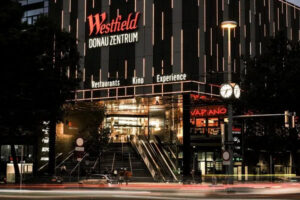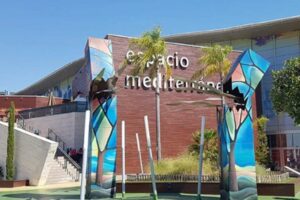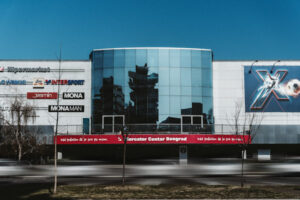Hamburg’s HafenCity is one of the world’s most important urban development projects. From 2022, Westfield Hamburg-Überseequartier will form its vibrant nucleus: a mixed-use quarter featuring creative and forward-looking concepts for living, working, enjoyment, and shopping. As a result, innovative ideas are in demand in all areas of the new development. In order to find, promote, and integrate these ideas, project developer Unibail-Rodamco-Westfield (URW) Germany is focusing its efforts on cooperation with start-ups and think tanks. Joscha Domdey, Innovation Manager, is in charge of coordinating these collaborations. Hamburg-based companies e-floater and Wunder Mobility are among the first partners.
Westfield Hamburg-Überseequartier will be a true digital native – both from a planning and a functional perspective. Consequently, URW Germany has considered all aspects of the digitalized district from the very beginning: from intelligent building technology to smart logistics and traffic control systems to tailor-made solutions for retail and gastronomy concepts. As a result, a flexible and agile quarter is being created in which brick-and-mortar and digital concepts are seamlessly integrated.
Innovative Mobility Solutions
Joscha Domdey is responsible for the integration of these concepts (see interview with him and Paul-Eric Perchaud): Three and a half years before completion of the quarter, it is incumbent upon the innovation manager to establish relationships with start-ups and think tanks that develop intelligent solutions for the future. The 29-year-old professional has already gained experience in this area within the company as part of URW Lab – an open innovation platform developed by Unibail-Rodamco-Westfield that cooperates with start-ups and companies to develop new concepts for the retail trade. Over the past few years, Domdey has also been responsible for so-called accelerator events, through which young companies can apply for strategic partnerships and investments.
Initially, Domdey’s primary focus with respect to HafenCity will center around mobility issues: “How people – whether residents, visitors, or employees – make their way into the neighborhood, how they move around within it, and how they depart it are central questions for us. In this area, in particular, there are promising solutions that we would like to further develop in conjunction with our partners and adapt to HafenCity.”
Keyword: Micro-mobility
Two Hamburg-based companies, e-floater and Wunder Mobility, are among the first partners with whom URW Germany is developing more concrete plans for cooperation in HafenCity. The keyword for e-floater is micro-mobility: The company develops low-emission and easy-to-use e-scooters for short distances in city centers. Registered users can easily borrow these scooters via an app. From 2022, e-floaters may also be used in Westfield Hamburg-Überseequartier, making it easier for visitors to make their way around HafenCity as well as to other quarters and city districts. “This collaboration with Unibail-Rodamco-Westfield has given us valuable insight into the requirements that our products have to meet and enables us to explore, in a very realistic scenario, how our products can be integrated into a project such as the Westfield Hamburg-Überseequartier,” says Oliver Risse, Founder and Managing Director of e-floater. “Of course, we are also particularly excited about the growth potential beyond this project that the cooperation opens up for us.”

Intelligent Carpools
Wunder Mobility is one of the fastest growing mobility tech companies in Europe and is paving the way for networked and sustainable mobility with its products. Through “Wunder Carpool”, Wunder offers an innovative technology solution for commuter carpools, which could be particularly suitable for those who work in the area. Through the use of an app, employees from different stores are brought together to share a vehicle among themselves.
“In view of the fact that the number of vehicles registered in Germany continues to rise, innovative concepts and developments are in greater demand than ever before. Using our technological solutions, we aim to help cities and companies offer sustainable mobility solutions to improve the quality of life in conurbations and rural areas,” explains Gunnar Froh, CEO of Wunder Mobility.
Focus on Additional Collaborations
Emphasis on innovation, start-ups, and think tanks is, therefore, part of URW’s overall corporate strategy. “Our cooperation with e-floater and Wunder Mobility is a great start for us,” says Domdey. He continues: “Naturally, our aim here in Hamburg is to develop a wide-ranging network and to initiate a large number of projects that will enrich community life in HafenCity, beyond the quarter itself.” In addition to the mobility themes, partners in very different areas are to be introduced. The spectrum ranges from co-working concepts to augmented and virtual reality applications to multi-sensory worlds of experience.
About Westfield Hamburg-Überseequartier
A total of 14 individual buildings are being constructed in Westfield Hamburg-Überseequartier, which will form a new, vibrant core of Hamburg. Retail, entertainment concepts, and more than 40 gastronomy units will be fine-tuned to connect offices, three hotels, a cruise terminal, and a total of 650 apartments. The mixed-use quarter, in which a total investment of more than one billion euros has been made, consists of a total area of 419,000 sq m and will be completed by URW by the end of 2022. The first cranes have already been erected on the construction site, and building construction has begun. The foundation stone was laid in May 2019.
Thinking about Innovation in a Comprehensive Way
Anything that enhances services and the customer experience or makes assets more efficient and sustainable is important. Joscha Domdey, Innovation Manager, and Paul-Eric Perchaud, Director of Operations, (both at URW Germany) place particular emphasis on innovation in Westfield Hamburg-Überseequartier.

Paul-Eric Perchaud Director of Operations at URW Germany, Credit: URW 
Joscha Domdey, Innovation Manager at URW Germany, Credit: URW
ACROSS: How relevant are intelligent and environmentally friendly transport offers in this area to increasing the attractiveness of a shopping center?
PAUL-ERIC-PERCHAUD: In general, innovative and resource-conserving transport concepts are playing increasingly important roles in large cities. As an urban destination that will attract millions of guests every year, we want to present a comprehensive range of sustainable services, from operations to energy supply and mobility. In the field of transport, in particular, we ask ourselves how people can access the district in the most comfortable and most environmentally-friendly way. As part of this process, we closely cooperate with partners, such as start-ups, universities, and research institutes, to ensure a fresh, forward-looking, and impartial look at all opportunities.
JOSCHA DOMDEY: In Hamburg, for instance, we specifically rely on e-vehicle charging stations, e-car sharing offers, general sharing solutions, as well as intelligent and networked mobility. This extended and modern range of smart services is both environmentally friendly and attractive to our guests. In the future, a digitally networked platform will serve as the crucial basis for the operation of urban environments.
ACROSS: “Wunder Carpool” by Wunder Mobility is currently running at the URW-operated Ruhr Park in Bochum. What are its empirical values?
DOMDEY: We were pleased to be able to start a pilot project at Ruhr Park via Wunder Mobility. At the moment, we are still in the establishment phase, and we are working on the acceptance rate. People naturally need time to adapt their habits, but we can confirm that the offer has been very well perceived by the employees. We are also receiving more and more positive feedback. So, we’re also very curious to see how people adapt in the long run.
ACROSS: Generally speaking, what intelligent solutions for the future are important for shopping centers?
DOMDEY: Digitization as a process changes almost every facet of our everyday lives. That’s why we think about innovation in a comprehensive way. It’s not the single solution that counts, but the entire ecosystem. With regard to Westfield Hamburg-Überseequartier, for instance, we have implemented a variety of innovative solutions: We have deployed intelligent building technologies, we have used smart logistics and traffic control systems, we have created tailor-made solutions for retail and gastronomy concepts, and we intend to implement virtual and augmented reality concepts – just to mention a few. Anything that enhances our services and the customer experience or makes our assets more efficient and sustainable is important to us.
ACROSS: Please explain the concept of URW Lab to us.
PERCHAUD: URW Lab, our innovation center at the Group’s headquarters in Paris, is the platform to facilitate this strategic approach. URW Lab was created in 2012 to define and spread an innovation strategy and establish our innovation roadmap. Via this platform, we make sure that promising ideas receive the dedicated resources they deserve. One of the most recent successes of URW Lab is the implementation of an omnichannel platform for food delivery services at Vélicy 2 in France.





